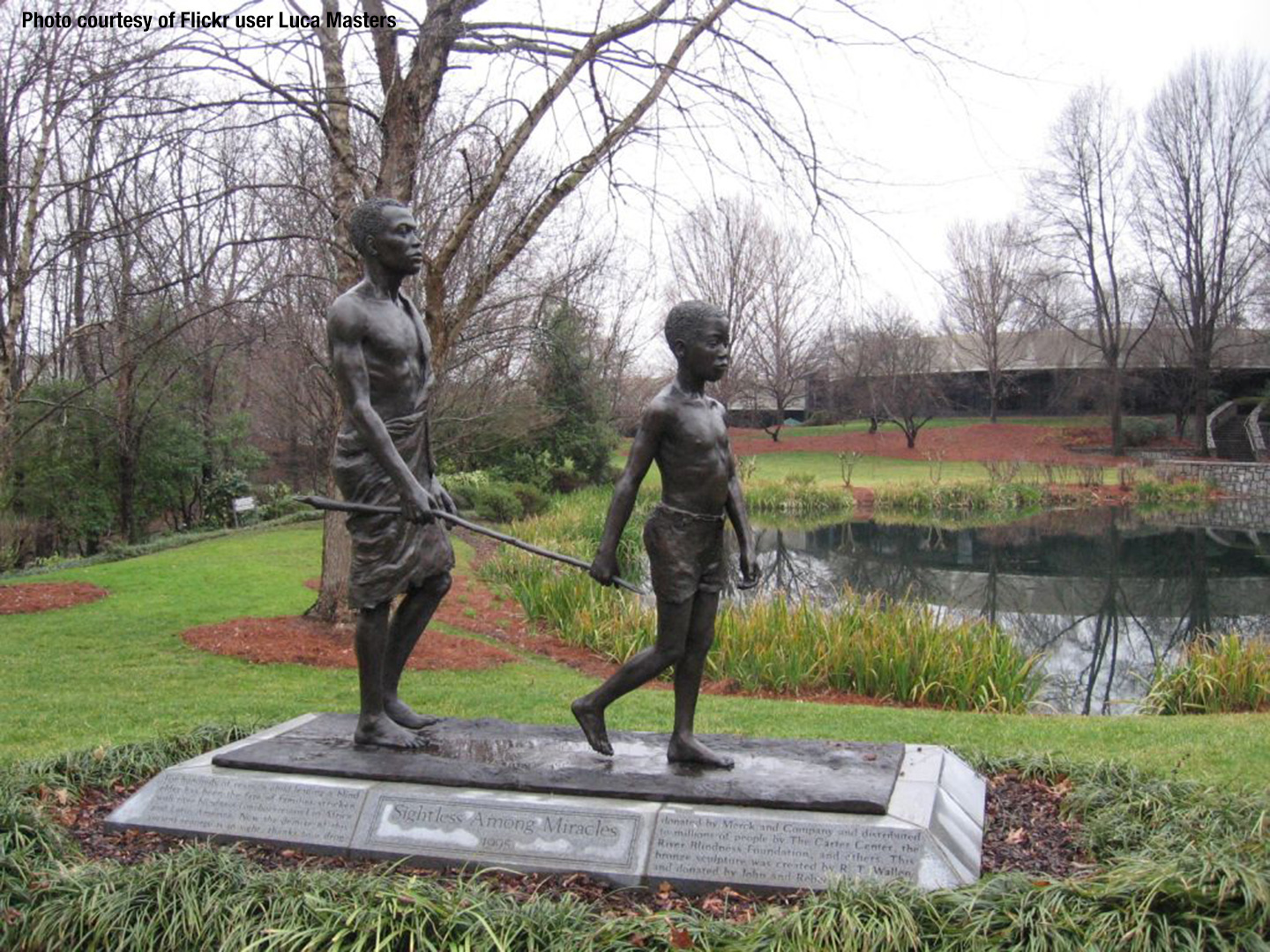Bruce Benton’s book, Riverblindness in Africa: Taming the Lion’s Stare (2020), documents the origins, stories, successes, and challenges of controlling, and eventually eliminating, a widespread, debilitating disease, onchocerciasis, in Africa. The book underscores that this was a deeply human endeavor, built on a network of personal relationships and commitment to a common goal that forged an extraordinary partnership. The book provides a glimpse into the central role of compassion – the desire to alleviate suffering – which drove key decisions. Alongside technical, logistical, and financial challenges, the book explores some of the programs’ ethical challenges which remain obstacles to onchocerciasis elimination (e.g., Mectizan-associated encephalopathy in persons with loiasis infection).
This event probed dimensions of the human side of the onchocerciasis-control story, including the role of compassion and the importance of trust. It examines how compassion, commitment, and innovation, which have been central to the long-term success of the onchocerciasis control, can lead to the completion of that effort in Africa. To date, the disease has been eliminated as a public health problem everywhere with the exception of Central Africa, where challenges remain to achieve lasting control. The symposium explored how commitment and innovations might halt transmission in the Central African subregion and thereby achieve elimination of onchocerciasis throughout Africa.
This event was co-sponsored by the Berkley Center for Religion, Peace, and World Affairs, Department of International Health at the School of Nursing and Health Studies, and the Global Health Initiative at Georgetown University with the Focus Area for Compassion and Ethics at the Task Force for Global Health.
This event will be recorded and a captioned video will be posted to this page after the event date. Please RSVP to receive an email notification once it is posted.
Note for event participants: Purchase Riverblindness in Africa: Taming the Lion’s Stare at a 30% discount with the code HTWN through John Hopkins University Press.
Featured
Bruce Benton is the author of Riverblindness in Africa: Taming the Lion’s Stare (2020). Riverblindness in Africa is the culmination of Bruce Benton's 40 year career focused on development assistance for Africa. Much of that career involved leading a World Bank-sponsored partnership to eliminate the disease throughout Africa.
David Addiss, MD, MPH, is the director of the Focal Area for Compassion and Ethics (FACE) at the Task Force for Global Health. He has held many positions at the Task Force including director of Children Without Worms program and senior advisor of the Global Partnership for Zero Leprosy program.
Dr. Uche Amazigo is the retired director of the African Program for Onchocerciasis Control at the World Health Organization. Dr. Amazigo is also a former university lecturer, biologist, and public health specialist.
Dr. Michel Boussinesq is director of research at the Institut de Recherche pour le Developpement (IRD). Dr. Boussinesq has worked for more than 20 years on the epidemiology of onchocerciasis and on the strategies to control the disease by ivermectin chemotherapy.
Brenda Colatrella is associate vice president of corporate responsibility at Merck. She has held several prior positions at Merck including executive director of HIV policy and programs and of global health partnerships.
John Gyapong is vice chancellor of the University of Health and Allied Science in Ghana. He has considerable experience in infectious diseases epidemiology, especially lymphatic filariasis, onchocerciasis, and malaria.
Adrian Hopkins is the former director of the Mectizan Donation Program at the Task Force for Global Health and former medical director of the Christoffel-Blindenmission in the Democratic Republic of Congo and Central African Republic. He has also been very involved in national planning and implementation of the WHO/IAPB Vision 2020 program to eliminate avoidable blindness.
Dr. Amy Klion is chief of the human eosinophil section in the laboratory of parasitic diseases at the National Institute of Allergy and Infectious Diseases (NIH). She previously served as a senior clinical investigator and staff clinician.
Bernhard Liese is director of the Master of Science in Global Health Program in the Graduate School of Arts and Sciences, as well as a professor and chair of the Department of International Health in the School of Nursing & Health Studies at Georgetown University. He has more than 30 years of experience in the field of health and development.
Katherine Marshall is a senior fellow at the Berkley Center for Religion, Peace, and World Affairs, and she helped to create and now serves as the executive director of the World Faiths Development Dialogue. She is also vice president of the G20 Interfaith Association. Previously, she worked at the World Bank from 1971 to 2006 and led its faith and ethics initiative between 2000 and 2006.
Dr. Hans Remme is the former manager of onchocerciasis operational research for the tropical disease research program at the World Health Organization (WHO). Following his retirement from WHO, he has continued to work as a consultant on implementation research and onchocerciasis elimination.
Jean-Louis Sarbib is director for Africa and the Middle East at Centennial Group International. He is a former World Bank senior vice president for human development.

